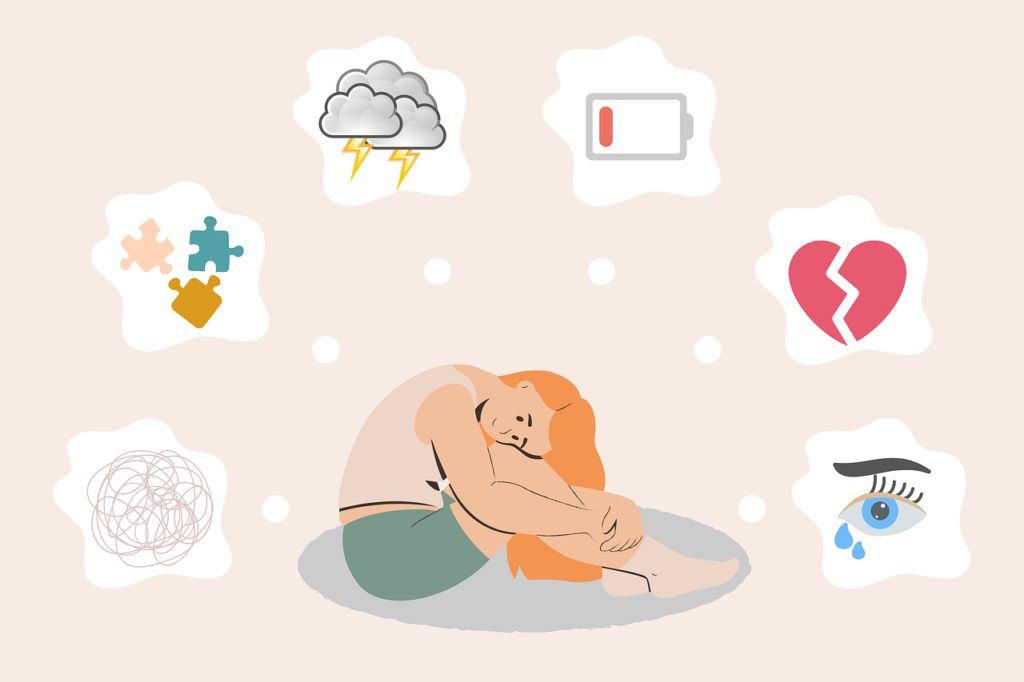4️⃣ Take Ownership of Your Mental Health Journey

🚨 No more generic advice.
No more feeling lost.
No more waiting for someone
else to hand you the answers.
It's Time To Take Ownership
of Your Mental Health Journey
This is your brain, your body, your life. And you have more power than you’ve been led to believe.
The wellness industry? Overcrowded with one-size-fits-all solutions that don’t consider your unique wiring, your past experiences or what actually works for you.
💡 Healing isn’t about following a trend. It’s about building a framework that fits your life – one that evolves with you.
🔹 Ari’s ADHD & Therapy Frustration – Ari has ADHD and spent years trying different therapy approaches. Standard cognitive behavioral therapy (CBT) never seemed to stick—he couldn’t remember the worksheets, and the advice felt too structured for his nonlinear thinking. When he finally found a therapist who incorporated body-based strategies (like EMDR and somatic work), everything clicked. Healing finally started happening—not because he “tried harder,” but because he found a method that actually worked with his brain.
🔹 Jess’s Anxiety & Meditation Struggles –
Jess has anxiety and was told by everyone that meditation was the key to calmness. But every time she sat down to meditate, she spiraled into anxious thoughts. Instead of forcing herself into a method that made her feel worse, she switched to walking meditations—pacing around her apartment, focusing on her steps, and breathing deeply. Suddenly, she found a rhythm that actually helped her regulate her nervous system.
🔹 Mike’s Bipolar Disorder & Routines – Mike, who has bipolar disorder, always struggled with extreme energy shifts. Productivity experts told him that strict morning routines were the key to success, but rigid schedules made his bad days feel unbearable. Instead of forcing himself into a traditional system, he created a “flexible structure”— a list of daily priorities that he could tackle in any order, depending on how he felt. This approach helped him work with his energy cycles instead of against them.
So, let’s bring it all together. No more passive participation. No more blindly following advice that doesn’t feel right.
➡ This is where you reclaim your agency!
✔️ Step 1: Recognize That No One
Else Can Do This for You
📌 Therapists, doctors, wellness gurus, biohackers – they all have insights, but they aren’t living inside your mind.
✔ No one else can fully understand what your anxiety, depression or ADHD feels like.
✔ No one else can tell you what your triggers, strengths and needs are.
✔ No one else can decide what healing actually looks like for you.
🚀 So, stop outsourcing
your power!
It’s easy to assume that the experts, influencers and “success stories” know better than you do. The world constantly bombards you with messages about the right way to heal, be productive and manage mental health. And when something doesn’t work, you might assume the problem is you – not the method itself.
💡 But here’s the truth: No one else has lived in your brain.
The key to real growth isn’t blindly following the next hot wellness trend. It’s using research, self-awareness and lived experience to make informed choices that actually work for you.
✨How You Might Be Outsourcing Your Power Without Realizing It
📌 Following Rigid Advice from Experts, Even When It Feels Wrong
🔹 Noah, who has ADHD, read a book on productivity that insisted waking up at 5 AM was the key to success. He spent weeks setting early alarms, only to feel groggy, irritable and completely unproductive. He blamed himself for being lazy – until he realized his natural chronotype makes him a night owl. Once he shifted his schedule to honor his peak energy hours, his productivity skyrocketed.
📌 Believing You Need Permission to Make Changes
🔹Maya, who struggles with anxiety, was told by a therapist that journaling every morning would help. But structured journaling felt like a chore and she started dreading it. Instead of trusting herself to find another way to process emotions, she kept forcing it – until she finally gave herself permission (in secret at first) to switch to voice memos instead. Now, she talks through her feelings in the car or on a walk and it actually helps.
📌 Forcing Yourself into the “Right” Coping Mechanisms
🔹 Jordan has emotional dysregulation and was told that deep breathing was the best way to self-soothe. But when he tried it, it made him feel even more agitated. He kept pushing through, convinced he just wasn’t trying hard enough. Eventually, he realized he regulates through movement – so now, instead of sitting still and breathing, he paces, shakes out his arms or dances to music. It made all the difference.
📌 Letting Others Define What “Healing” Should Look Like
🔹 Taylor, who has bipolar disorder, felt like she had to follow the wellness world’s strict self-care regimens – meditating daily, cutting out caffeine, doing yoga. But none of it resonated with her. When she started focusing on her own version of balance – small, realistic changes like eating regular meals, tracking mood shifts and keeping a flexible routine – her mental health actually improved.
The Shift: Start Asking Yourself…
🔹 “Does this resonate with me?”
🔹 “Does this work with my energy, my brain, my reality?”
🔹 “Am I doing this because I want to – or because I think I ‘should’?”
💡 Your mental health journey is yours. Advice and research are valuable tools—but they’re just that: tools. You get to decide what stays and what goes.

🔹 Start Your Journey by Taking the Quiz!
The simple truth is, millions of people are affected by mental disregulaions each year – over 40 million adults in the U.S. alone.
But what if the root cause of your mental health struggles was hidden, right there in plain sight, within your own genes?
✔️ Step 2: Build a Mental Health
Framework That Works for You
🌱 A truly holistic approach means taking every piece we’ve discussed – your genetics, your habits, your environment – and consciously weaving them into a custom-built strategy that truly aligns with you.
No more one-size-fits-all solutions. No more forcing yourself into systems that don’t work. This is about understanding your mind and body deeply so you can work with them, not against them.
How to Build a Wellness Plan That’s Actually Effective
🔹 Integrate Genetic Insights → Your DNA holds powerful clues about your neurotransmitters, metabolism and stress response. Instead of working against your biology, you can optimize your lifestyle, nutrition and supplements based on what your body actually needs.
🔹 Use Holistic Strategies → The wellness world is full of passing trends and quick-fix solutions. But true, lasting change comes from proven methods – like nutrition tailored to your genetics, targeted movement, mindfulness and environmental detoxification. These strategies have been backed by science and tested over centuries.
🔹 Embrace Self-Discovery → Your mental health isn’t just about symptoms – it’s about patterns, triggers, strengths and adaptability. By tracking what affects your mood, energy and focus, you can refine your wellness plan to fit your specific needs.
🔹 Take Ownership → Instead of relying on external systems, medications or validation to “fix” things, you become the expert on yourself. This means making informed choices, trusting your observations and shaping your life in a way that supports your brain, body and goals.
🔥 Why This Matters:
When you take ownership, you stop feeling helpless. You’re no longer waiting for a doctor, a diagnosis or a new trend to save you. You begin to actively create a lifestyle that helps your brain thrive – one that’s sustainable, empowering and uniquely yours.
📖 Study Reference: Vohs & Baumeister, 2016 – “Self-Regulation and the Power of Personal Agency”
➡ This study highlights how self-regulation and personal agency lead to greater resilience, mental stability, and life satisfaction. The more control you feel over your choices, the more motivated, confident, and emotionally balanced you become.
🌟 This is what true holistic wellness looks like—science-backed, deeply personal and completely sustainable.
Own Your Mental Health
✔️ Step 3: Stop Waiting for the “Perfect Plan”
There isn’t one.
🚨 No perfect routine.
🚨 No perfect diet.
🚨 No perfect self-care method.
And chasing perfection?
It’s a trap.
The truth is, waiting for everything to align – keeps you stuck. It convinces you that you can’t start until conditions are ideal – until you have the perfect morning routine, the best supplements or the “right” mindset. But real progress doesn’t happen in perfect conditions. It happens in messy, real-life moments where you choose to take action anyway.
🌟What Healing is Actually About
✔ Consistency Over Perfection → The small steps you take every day matter more than one perfect action once in a while. A 5-minute walk is better than waiting for the motivation for an hour-long workout. Eating one balanced meal is better than stressing over the “perfect” diet plan.
✔ Adjusting & Adapting → Your needs will change and so will your wellness journey. What works for you today might not work next year. And that’s okay. The key is to try, learn and refine.
✔ Progress Over Aesthetics → Social media sells the illusion that wellness is about a flawless routine, a beautiful smoothie bowl or the idealized morning ritual. But true healing isn’t about how it looks – it’s about how it feels. It’s about what makes you function better in real life.
✨ The Best Plan is the One You Actually Follow
If you’re waiting for:
❌ The motivation to be perfect
❌ The time to be just right
❌ The knowledge to feel complete
…you’ll never start.
🔥 Instead of waiting, just begin.
💡 Choose one small step today – something that moves you forward. Drink more water. Breathe deeply for a minute. Swap out one processed snack. Whatever it is, do it now, even if it feels imperfect.
Because imperfect action is better than perfect inaction.
📖 Study Reference: Dweck, 2006 – “The Growth Mindset and the Science of Personal Change”
➡ This research proves that progress comes from a mindset of growth and adaptability—not from waiting for perfection. Those who take small, consistent actions improve over time, while those who chase perfection often never start at all.
🌱 Your wellness journey doesn’t start with a perfect plan—it starts with a single step.
Own Your Mental Health
✔️ Step 4: Own Your Choices
(And Stop Explaining Yourself)
Your mental health is your responsibility.
Not your family’s. Not your coworkers’. Not your friends’.
And here’s the truth: You don’t owe anyone an explanation for how you choose to manage it.
🚨 Not your family who thinks you should “just push through.”
🚨 Not your coworkers who roll their eyes when you set boundaries.
🚨 Not your friends who don’t “get it” and tell you to “just relax.”
You Have Full Permission To:
✔ Do what works for you → If grounding exercises help you reset, do them—no matter how “weird” someone else thinks they are.
✔ Set boundaries without guilt → If avoiding caffeine keeps your mood stable, stick with it—even if others say, “Oh come on, it’s just coffee!”
✔ Honor your personal needs → If quiet mornings help you function better, protect that time—even if people expect you to be “more social.”
👉Because your wellness isn’t up for debate.
Stop Justifying, Start Owning
One of the biggest energy drains isn’t the work it takes to care for yourself – it’s the emotional exhaustion of defending your choices.
💡 “Why don’t you drink?” → Because I don’t. No explanation needed.
💡 “You’re really strict about your schedule.” → Yes, I am. Because it keeps me stable.
💡 “You’re being too sensitive.” → No, I’m honoring my limits.
You don’t have to argue, convince or prove anything. The moment you stop explaining yourself is the moment you reclaim your power.
Your Choices Don’t Need Approval
✔ You don’t need others to understand your limits. You just need to enforce them.
✔ You don’t need permission to prioritize your well-being.
✔ You don’t need validation for the tools that help you function.
Because at the end of the day, you are the one living in your mind and body – not them.
📖 Study Reference: Brown, 2010 – “The Power of Vulnerability and Authentic Living”
➡ This research highlights that true self-acceptance comes from owning your authenticity, setting boundaries, and letting go of external validation. People who stand firm in their choices experience greater emotional resilience and self-trust.
🌱 Your healing journey is yours alone—own it, protect it and stop explaining it.
Own Your Mental Health
🚀 The Bottom Line:
You Are the Architect of Your Mental Wellness
You’re not broken. You don’t need fixing.
You need a game plan that actually works for you.
✔ Understand how your brain works.
✔ Ditch the cookie-cutter advice.
✔ Trust your instincts.
✔ Take ownership and build a life that supports your unique mind.
Because no one is coming to save you.
But that’s the best news of all – because it means you’re in control now.
💥 And you’ve got everything you need to make this work.
Bringing It All Together
You don’t have to guess when it comes to your mental health. By understanding your genetics, optimizing your nutrition, and using science-backed holistic strategies, you can take control of your well-being.
👉 Take the Quiz to Identify Key Areas You Should Focus On!
👉 Join The Wellness Collective—Your Community for Personalized Mental Health Solutions!
Your mental wellness journey is unique to YOU. Start exploring these strategies today, and take the next step toward lasting clarity and balance!
✅ [Share This Post on Pinterest] ✅ [Follow Us on Instagram for Daily Tips]
Keep Digging Deeper
Genetics is just the first piece of the puzzle. Once you understand your unique blueprint, the next step is learning how to work with those newfound insights!
🔹 Read: 1️⃣ Get Curious About Their Own Biology – Learn how genetics, nutrition, and neurotransmitters shape mental health.
🔹 Read: 2️⃣ Holistic, Science-Backed Strategies – Go beyond the basics with customized approaches that align with your genes.
🔹 Read: 3️⃣ The Power of Self-Discovery – Learn how the right nutrients and habits can support your genetic pathways—while avoiding the ones that make things worse.
Disclaimer: The information and/or products mentioned in these article are provided as information resources only and are not to be used or relied on to diagnose, treat, cure or prevent any disease. The statements made in this article have not been evaluated by the Food and Drug Administration. Any products mentioned are not intended to diagnose, treat, cure, or prevent any disease, but rather to be considered as an informational resource only to encourage critical thinking and personal research. The information in this article is intended for educational purposes only. The information is not intended to replace medical advice offered by licensed medical physicians. Please consult your doctor or health care practitioner for any and all medical advice.
Sign up for our weekly newsletter. it's free!

52 Weeks, 52 Topics! Get Our Latest ‘Stay Well’ Newsletter Every Monday And Start Your Week Off AllNaturWell. A New Tip, A New Study Revealed, A New Product Reviewed. Get It Right To Your Inbox Weekly. No Need To Wait. It’s Free!
